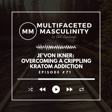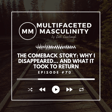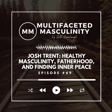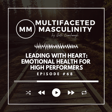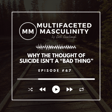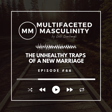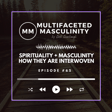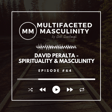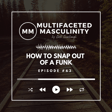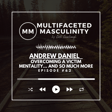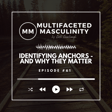Become a Creator today!Start creating today - Share your story with the world!
Start for free
00:00:00
00:00:01

Riding the Waves of Grief Post Divorce | Ep#47
Most of us have either been through a divorce ourselves or know someone who has.
In today’s episode, Josh and Seth discuss what it’s like to “ride the waves” of grief that come with the loss of a marriage. As two men who have had to navigate this world, they have some first-hand experience on how to move through the grief to find a beautiful life on the other side.
In this episode you'll learn:
- What are the stages of grief
- How can you “move through” the grief and find hope.
- Why you should embrace the process instead of trying to avoid it.
- What happens if you try to suppress the grief?
Links
Host Name: Josh Cearbaugh
https://www.instagram.com/jcearbaugh/
https://facebook.com/joshcearbaugh
https://www.jumpstartyourlife.com
LinksHost Name: Seth Conner
https://www.instagram.com/sethaconner/
Transcript
Exploring Masculinity and Emotion
00:00:00
Speaker
Men, we are not simple, chest-thumping, rock-smashing, fire-starting barbarians. We have depth. We intensely feel. We are scared, yet brave. We love to have fun. We're imperfect and make mistakes. We're compassionate and loving. We are multifaceted. Let's explore the reality of masculinity together.
Grief and Divorce: Personal Journeys
00:00:31
Speaker
Today's conversation is going to be hopefully enlightening, just in the sense of understanding how to process the grief. And it really came from the fact that, um, you know, I went through a divorce a couple of years ago and recently it was my anniversary. And it's not that I was expecting that day to be an amazing day or a horrible day.
00:00:57
Speaker
But I was actually caught off guard by the wave of grief, as we're calling it in today's episode, that kind of washed over me or hit me. It kind of caught me off guard. We're going to get into more of the details of that.
00:01:13
Speaker
As we go into today's conversation but i think it's important to talk about the reality that. Going through a divorce is requiring you to grieve the death of a marriage first and foremost and.
00:01:32
Speaker
You know, both Seth and I, like we've both been through a divorce and so we all know all too well and our stories are a bit different, but I think there's similarities in the sense of understanding grief and how to navigate through it and the importance of choosing to lean into that and process through it in a healthy way rather than do what a lot of people do, you know, when they're grieving.
00:01:53
Speaker
In sense of suppressing or shutting down etc so i'm seth i guess first and foremost the i'd be curious to hear from you. Just no overarching understanding of stages of grief we're not we're not going exclusively into grief today in the sense of a full teaching on grief but just kind of high level.
00:02:16
Speaker
What what's a common kind of process that people walk through when it comes to. Navigating the emotion of grief.
Understanding and Experiencing Grief
00:02:25
Speaker
Yeah, and. I I think that it's important just to make a disclaimer here that, you know, we are talking about riding the waves of Greece grief post divorce, but that everything that we talk about today, it can be applied to just
00:02:41
Speaker
Grief in general, grief being the pain of loss, the pain of loss of something, whether it's a relationship, it could be a business opportunity, a broken promise. I know we're going to even talk about memories. I know I want to. Just the grief that I feel in the memories that I have of the past,
00:03:04
Speaker
and the promise that those had at the time and now they're just memories. But even just expectations and how that creates disappointment and what we do with that grief and how most people avoid grieving because it engages them with the pain.
00:03:23
Speaker
But there's like the levels of grief that have really been kind of created or drawn out just to go through them real quick just so we have them there. And then we'll dial into the different ones that I know we wanna talk about. But the first one might be disbelief or shock, right? If something happens, now we're in a place of disbelief. We don't really, we're confused. We don't really understand what's going on. We're in shock. Then we move into denial where we're just gonna like
00:03:52
Speaker
nah, this isn't really happening. And then once denial is done and we're done denying the fact that something has happened, we've lost something, then we get angry, right? Now we're in a place of anger. And then we start to engage with the guilt, like maybe what is our side?
00:04:08
Speaker
This wouldn't have happened if I didn't do X, Y and Z and feeling the pain of the guilt. And then we kind of move into this place of bargaining, like trying to manipulate either God or somebody else or even ourselves. And so we start bargaining, I'll do this, if you do that, we kind of try to make a trade.
00:04:27
Speaker
And then once we get towards the end of these different levels or stages of grief, we feel the depression. We kind of get really low. We've had this emotional roller coaster and now we're just kind of crashing down, hitting bottom. And then we arrive at the place of acceptance. And that's what we want to reach, you know, is that place of acceptance where we can, from that place we're no longer a victim,
00:04:55
Speaker
we can start creating our world now and moving into that place of creator. So that's just like a brief kind of overview of the quote unquote seven levels or seven stages. I like to call them levels Josh just because stages sounds like
00:05:12
Speaker
You know, we move from one to two to three to four and we eventually get to seven and we're cured. But in my experience, I bounce between all of those. Like I'll go from like one to four to three to six, eventually arriving at seven. So I'm like on an elevator just going up and down on these different levels.
Anger and Grief: Distinctions and Acknowledgment
00:05:32
Speaker
Sometimes I have to, even if I get to a place of acceptance with, with something, I realized later that there might be a part of it that I still haven't grieved yet. And I have to go back to one of those, those, um, those levels. Yeah. And I, I mean, just to touch real quickly on, I think all of them are important to navigate, but if there is one emotion, I think that just people in general, but men,
00:05:57
Speaker
need to learn to be okay on. And I actually think this would be a great episode for us to dive into a little bit further is the emotion of anger. You know, I had a client who lost a niece and was going through these stages. And I remember, you know, she at the time was, she felt shame
00:06:20
Speaker
for feeling angry at God for it happening. And I remember telling her, you know, it's God's not afraid of your anger. It's OK to actually be angry and to to question him and the situation, etc. And to just give her permission, which I think if you're if you're processing through grief, you need to be OK with letting that anger be present as part of the grief.
00:06:46
Speaker
You know, and that's it's not to say it's permission to specific for divorce. You know, a lot of times that anger is pointed at the X, right? You know, why didn't you do this or that or, you know, whatever. And it's not so much that as much as it is anger as as as a healthy emotion in response to the the loss that you're having to navigate. Because like you said, it I think
00:07:14
Speaker
Before we go any further it's to understand that divorce in and of itself is a death is the death of a marriage and so when you see it that way.
00:07:26
Speaker
You know, a lot of people, they look at it as a failure, right? I didn't, I wasn't able to make the marriage work or we weren't able to make the marriage work. And so they go into it laced with shame and disappointment, understandably. But if you look at it for what it is, which is there is actually a death taking place.
00:07:47
Speaker
Then you can better understand and approach the process of grieving for what it is. It's grieving and death. Like you said, you know, I, we had several memories together, you know, my ex and I, we were married for 11 years. We knew each other for 15 years and, and, and so.
00:08:05
Speaker
We did life together. We moved places. We pursued dreams and had community. And there's a loss there, had children. And there's the loss of those memories. Those memories are still there, but there's the loss of continuing to build those memories.
00:08:22
Speaker
As well as the dreams, like there's a death in the dreams that, you know, you at one point, even if things didn't end well at one point, you guys sat on a porch and had coffee or were on vacation or whatever laying in bed after having sex. And you're you're dreaming together about the life that you're wanting to build. And that's no longer present. And and so to see it for what it is, which is there is a death that has taken place and it's
Divorce vs. Death: A Comparative Grief
00:08:50
Speaker
not easy. You know, my dad
00:08:52
Speaker
his first wife died of cancer. And then he ended up getting divorced from my mom after I had grown and moved out. And I remember having a conversation with him where he said, you know, both were hard and and painful, et cetera. But it was almost easier not to misconstrue that word, but
00:09:13
Speaker
for his the loss of his first wife because there was closure there. And especially if you have kids, you know, you're sharing custody and you're still hearing about the other person's life from your kids and all of that still there. So it's almost like picking at that scab. And so understanding that those these waves of grief, you know, may may be drawn out or resurface more frequently within a divorce situation than necessarily a loss of someone, a physical death, because you have that closure.
00:09:43
Speaker
and to just be okay with understanding the reality that that is part of navigating divorce is first and foremost seeing it for the death that it is and then understanding that you're going to go through all of these stages or ride the elevator. I like that analogy within the grieving process. Well, you're moving me into a level of depression just listening to you.
00:10:14
Speaker
talking about how sad those things are, but probably just because I'm resonating with what you were saying about the marriage part. And yeah, there's, I mean, especially this time of year, and it's interesting that we're talking about it, as we move into the holiday season, people are, they are recalling years past, you know, and memories past.
00:10:34
Speaker
Even just thinking about it, I'm feeling emotional because this time of year was so special to me, especially when I had kids, because I wanted to create this time of year as something very memorable. And so when we get to touch back on anger,
00:10:53
Speaker
The first year after separation or divorce, I just remember feeling so angry that I don't get to have those same memories as a family unit anymore. And now I don't have it in a house with my wife and the kids, all of a sudden.
00:11:13
Speaker
My marriage, and I might've touched on this in a previous episode, I look at my marriage of eight years. And even in the beginning, I would say that I looked at it as 20% good and 80% bad.
Managing Grief and Emotional Awareness
00:11:29
Speaker
Just the hard times, the bad times, we just never really were able to connect as well as I'd hoped. We weren't really a good match objectively.
00:11:38
Speaker
And so 80% of the time it was bad and 20% it was good. But this time of the year, no matter what bad stuff was happening.
00:11:46
Speaker
It was good. Like we were having a lot of amazing memories. And so now I'm feeling the grief of not having those anymore. And it makes me angry. And like you said, how we process anger is very important. Some men don't even, they won't even allow themselves to feel that emotion because they weren't allowed to feel it as children. And so we're taught not to feel it. But you were saying like, feel angry, but don't essentially,
00:12:12
Speaker
Essentially, don't sin in your anger. Don't let your anger come out in a messy way and create more issues with people. Don't have it come out in a messy way towards somebody. Don't be essentially pointing your anger energy at somebody. But there's a way to, in a healthy way, process that anger. I know in the past, one of the ways I did it, it was very therapeutic, was to go,
00:12:38
Speaker
Beat a pillow or get up on a pillow, go get a bat, beat against a tree. Yeah, something like that.
00:12:45
Speaker
Yeah, that was a that was a very common homework assignment that I give the clients, which is go for a walk in the woods, make up a stick and beat the shit out of a tree. Like because our bodies hold emotions and there's an energy attached to those emotions. And so we need to actually let those out and anger. Like I said, it could and should be its own episode to really dive deep within the layers of that. But just to touch real quickly, I think
00:13:12
Speaker
It's it's either we weren't allowed to express anger as children or. We the model that we were given for the emotion of anger actually wasn't anger. It was rage. It was an unhealthy overpowering emotion in order to shut you down. And so men who have good hearts are afraid to be OK with anger because their association with anger is actually rage, which is directly connected to the pain from their childhood and.
00:13:39
Speaker
And so I mean I don't want to fixate on that one one emotion too much just because there are the the layers of that. But going back to you know the waves of depression or the waves of grief that are associated with with divorce you know I I used to say if if grief is a wave I I learned how to surf.
00:14:01
Speaker
Off of the coast of california on a nice day where the waves crested a foot or two and then divorce happened which i didn't want i didn't see coming i lost myself in the attempt to fight for my marriage and.
00:14:20
Speaker
So then when it actually came to an end, it was it was one of my worst case scenarios because a dream of mine was to grow old together. Right. And and so it was like I went from like, oh, yeah, I can I know how to navigate grief to all of a sudden getting dropped off of the coast of Hawaii with a typhoon coming in where they've got those 40 foot super waves and it comes crashing down.
00:14:47
Speaker
And i remember distinctly remember being on the ground in the fetal position bawling just going like how did this happen why that whole denial piece and.
00:15:00
Speaker
the disbelief and the shock, that felt like super waves. Fortunately, I had established relationships with a few core men, which I think is vital for healthy masculinity, where I would purge that grief, but at the same time, I would reach out to them. One was my brother and one was a close friend.
00:15:23
Speaker
I would be on the phone bawling not understanding i was in that disbelief shock denial stage when it was first happening. And those waves subside but those waves don't go away like the ocean always creates waves no matter what and back to my anniversary.
00:15:44
Speaker
It was just it was a wave I didn't see coming, you know, and so it kind of caught me off guard where I woke up that day and I was kind of feeling off and feeling down and wanted to check out, go to my escape mechanisms, you know, just kind of run to that familiar place of temporary safety instead of processing through it.
00:16:03
Speaker
And it was about midday when I I caught like oh wait today would have been our anniversary. And just understanding the concept of the ways of grief and the pain that is consistently still associated with the reality of divorce.
00:16:19
Speaker
Then I took the rest of that day, I think I had Marco Poloed you and connected with a few people and then just kind of took that afternoon to let myself feel more of that depression slash guilt, pain side of things. And recognizing that for what it was, letting myself, giving myself permission to kind of have an off day to grieve
00:16:45
Speaker
Then the next day I woke up that wasn't like all of a sudden I was on top of the moon or anything but I woke up feeling better because I let myself process through that wave instead of try to fight it and double down on work and ignore that that's happening or drink extra coffee and get
00:17:07
Speaker
get myself shaking and productive, etc., which I think a lot of men gravitate to unintentionally, subconsciously. We feel this wave coming and so we exert a ton of energy to try to just suppress it and keep it at bay by staying busy or numbing out or all of the unhealthy things that we can escape into to try to suppress it.
00:17:33
Speaker
Yeah, I mean these emotions are very uncomfortable. I understand why we avoid looking at these emotions and actually grieving. I understand why we don't. I think that some people even enter into some of these stages unbeknownst to them and they might move directly into depression.
00:17:51
Speaker
and and instead of you know working through the different stages they they numb out like you just said they they medicate and that's and I get why people do I get why people have addiction I understand why people binge on Netflix or drink too much or you know
00:18:11
Speaker
throw themselves into pornography or work or gambling or shopping or eating is a big one. You know, I understand why we do those things is because we're all trying to avoid these really uncomfortable emotions. But how important it is to just recognize where you're at.
00:18:28
Speaker
in the grief stages or in the grief levels so that you know that, hey, I don't have to stay in this place. Like you did, you gave yourself permission to move through probably, I don't know if you, you felt disbelief and shock initially, but you probably bounced between these different stages on your anniversary to eventually land on acceptance maybe the next day. I don't know, but what did your grieving actually look like
00:18:58
Speaker
on that day.
00:19:00
Speaker
It looked like looking at porn and masturbating about nine times. Really? Is that? Yeah, I just went to town. OK, no, no. I love how you just get real. Yeah. No, no, no. Which would be fair. I wouldn't even I wouldn't even judge you for that. You know, but yeah. Yeah. I mean, I definitely porn was an escape mechanism, for sure, for me. And that's probably why I use that as the joke. But
00:19:29
Speaker
you know, for me, it was it's not like it's a clear defined, you know, okay, on my anniversary, I felt depressed, I felt pain, I felt anger, like, I wasn't trying to necessarily identify these different, you know, levels that I was on necessarily. But what it did, and so in that also, it was the next day, it's not like, okay, now I've arrived at acceptance, you know, right? But
00:19:55
Speaker
That it you know we would often say you feel like you have a wet blanket you know just kind of over you and. And that's that's really what I felt it was more of the depression you know kind of the pain associated with it but then that next day it wasn't that I consciously said I've arrived at acceptance now.
00:20:13
Speaker
But that's essentially what it was. I was able to move through that day and still take time to...
Heart Openness Post-Divorce
00:20:24
Speaker
What I did was I felt down, I felt depressed, I felt pain, all of that.
00:20:30
Speaker
We're going to get into this in a second, but because I've chosen to live with my heart open, I also took time to acknowledge the good that came from my marriage and to be grateful for my ex and to counterbalance some of that depression and negativity with gratitude and love, which moved me into that next day. I'm going, okay,
00:20:53
Speaker
Now i'm i'm this is where my life is the reality of it this isn't what i planned but this is where i find myself and. You began to continue to move forward in that and and so that's kind of the thirty thousand foot view of of how i approached it but i think it ultimately comes down to. And we touched on it a couple ways but maybe a way of saying it is.
00:21:17
Speaker
you get to choose, on the other side of divorce, as a man, you get to choose to live with your heart open or your heart closed. And, excuse me, what I mean by that is if you choose to live with your heart open as we have, you're going to feel those waves through the divorce process as well as after. You know, like it's been a couple years and I'm still, I didn't see that wave coming, but it's still there.
00:21:46
Speaker
But you also are able to access that gratitude for what you had, for those memories, for that other person. You know, I'd be lying if I didn't say that my marriage helped me evolve as a man, even within our dysfunction, our codependency, the
00:22:02
Speaker
unhealthy aspects of it, there was still good that came from it. And it helped me grow in certain ways. And it's helped me keep my heart soft in the sense of empathy and connection for myself, for my other relationships, towards my kids. It keeps me in a heart posture and a position where I'm able to emotionally be present in life.
00:22:29
Speaker
And then ultimately, it's helped me find ownership and acceptance and grow as a person and find healing, which has then translated into, you know, the relationship I'm in now is fundamentally different on a lot of levels, not just because it's a different person, but because through the divorce process and keeping my heart open, I was able to identify areas that I needed to take ownership that I didn't take ownership within my marriage.
00:22:57
Speaker
And to evolve as a person which ultimately helps you keep that prevent from. Recreating another relationship based on those unhealthy dynamics you know a lot of people men we're talking about specifically if you respond to the grief of divorce by closing your heart.
00:23:17
Speaker
It may help you actually produce more results in business temporarily or whatever. But what it also does is it ultimately causes you to become bitter and resentful or requires you to continue to exert energy in suppressing and staying numb or being attached to your coping mechanisms. And what that does is it blocks you from taking ownership
00:23:44
Speaker
And so you find these guys that, you know, they've been married three, four or five times. And ultimately what they're doing is they're just recreating the familiar, which was unhealthy because they haven't let their heart remain open, process the grief associated with it, and really not just find acceptance as for what the divorce was or what the marriage couldn't be, et cetera, but to take ownership in those areas that they need to and evolve and grow as a man.
00:24:14
Speaker
Yeah, it's so good. That's really good because what you're essentially hitting on here is that when
Ownership and Personal Growth in Grief
00:24:20
Speaker
we don't take a look at where we're at and take ownership, then we do stay close because we don't want to look at it. We don't want to take ownership. We want to blame the other person. It's really easy to do that.
00:24:37
Speaker
And to go back to, you know, the question I asked of just like, how did you grieve? As soon as I asked you that question, I was thinking, you know, you answered it so well. It's like during my grief day, I'm not sitting there going, OK, I'm in stage three now. All right. OK, I'm going to know an hour later, moving into stage six.
00:24:56
Speaker
But that's just not reality. And I'm reminded, it's kind of funny, it's kind of a military metaphor and the fact that it's Veterans Day, it makes sense, so I'm gonna use it. But when we're on the battlefield, we don't stop.
00:25:11
Speaker
and clean our gun, clean our weapon, make sure it's firing okay. No, we're trying to attack the enemy, right? And so to sit in this place of confusion and chaos and feeling a whole bunch of emotions, we're not sitting there going, okay, where am I? What stage am I in? Doing this introspective thing. That's just not reality. It's not possible. And so being able to just,
00:25:34
Speaker
give ourselves grace to be where we're at, to be honest with where we're at in the moment and just do the best that we can. And then in a couple of days we can look back and go, okay, I was feeling this, I was feeling this. Okay, I see where I was in this place of grief. And I think that is part of keeping our hearts open is recognizing where we're at. I know, and one thing I wanna touch on in regards to the emotions of grief
00:26:02
Speaker
And one thing that men really have a hard time doing, and I'm assuming that you did some of this on your grief days during the anniversary, because I celebrated my, well, I shouldn't say I celebrated, I had my anniversary. I did the same thing. I had our anniversary, what would have been our anniversary come up recently as well. And I didn't feel, I don't recall feeling anything
00:26:26
Speaker
like you had felt on your anniversary recently. And I'm wondering, I sit there and I wonder why. And I reflect on the year previous or the year before that. And I'm like, oh yeah, I did have a...
00:26:41
Speaker
a period of time where I was grieving and moved through those different stages where I remember feeling the anger. I remember pointing the finger at her, being resentful at her, which, you know, that's okay. If you just realize afterwards that if you stay in that place of resentment, then it's not going to help you any, right? But if I can go, okay, I resented her. Now I can forgive her. And one of the big helpers for me at that time, I just remember sitting on
00:27:07
Speaker
the couch and I happened to be working with some plant medicine that night, working with some psilocybin mushrooms and it helped me move into that place of forgiveness. I was having trouble navigating these emotions and after working with that medicine or in the middle of it, I was able to kind of sit there
00:27:28
Speaker
and just almost like I was engaging with her and just saying, I forgive you for this, that, and the other thing. I don't want to be angry anymore. I know I had my part to play. I took ownership in my side of the road in this relationship. Now, I see all that also to say that
00:27:49
Speaker
Since then, I've still had moments where I haven't been the best, where I feel upset with her and I move back a level into anger or into depression. And so this is a process. And even though I might've come to acceptance on some things in my post divorce, there's still other things I have to revisit and give some attention to. And how I react to those things, like we talk about the default mode network.
00:28:19
Speaker
The way that I used to default, that default my responses and reactions to her have changed because one, I'm working with plant medicine, but two, using that to help me identify my blind spots and saying, okay, I can't react the same way anymore. I have to change my default reaction, my response to her, to my life, because I can't be the victim anymore.
Innovative Healing: Plant Medicine and MDMA
00:28:43
Speaker
I need to be the creator of my own life and move post divorce into something
00:28:47
Speaker
that's powerful. So I can take that into my next relationship, which I have, like you, like you have into your relationship. Like this relationship that I have right now would not have come about, would not have come about if I wasn't ready for it. And it took all of, it took that grieving process for a year, two years to get me to that place where I can now bring strength to this new relationship. So.
00:29:12
Speaker
Yeah, I mean, I couldn't agree more. That's we'll probably always interweave plant medicine into some of our conversations in some capacity because.
00:29:22
Speaker
It's not necessarily plant medicine, but I remember distinctly probably one of the biggest things in my process of healing and understanding this whole journey of grief and these waves was I had an evening with MDMA and where I essentially sat down in my room, sat across from my ex. She wasn't there, but
00:29:47
Speaker
in the moment, you know, visualized her sitting there and we just had a conversation and I was in this place of love and understanding and I was able to really
00:30:00
Speaker
It helped me move into the acceptance more than I think probably anything did because I was able to share honestly where I had fallen short, to grieve in this place of love, from help with the MDMA.
00:30:21
Speaker
to acknowledge the reality of the loss and to identify areas that I needed to take acceptance and to lovingly call out the areas that she fell short, et cetera. And it's not that I needed to have that conversation with her in person necessarily because the reality is we're cordial and we're even friendly now because she's also gone on a journey of healing as well.
00:30:48
Speaker
just working with whatever it is, whether it's ketamine, ayahuasca, psilocybin, just there, there are so many things that can help assist you with approaching the grief process in a way that disrupts some of the, some of the desire to stay in that victim state and to really keep your heart open and to process through.
Rebuilding Life and Relationships
00:31:13
Speaker
And ultimately, you know, I mean, it's,
00:31:16
Speaker
I'm hesitant to say the goal because it's not like you arrive at a place, but really, regardless of why you got the divorce, the goal is to be able to move forward, to have a life after divorce that doesn't incorporate the unhealthy aspects that you were stuck in within your previous marriage. And so riding those waves of grief or just giving yourself permission to ride that elevator
00:31:45
Speaker
of those different stages and be aware that they may come up, it helps you accept the reality of your life. It's not what you might have envisioned or desired or wanted, but it helps you move through that and begin to build a new life moving forward or to continue to build your life moving forward. I think it's really important to
00:32:09
Speaker
To be willing to set aside intentional time whether that is sitting with plant medicine or you know on your anniversary or coming into the holiday season to be aware that those waves may be present and.
00:32:22
Speaker
You know, my partner is also divorced and so we're able to have this common ground where, you know, I understand she still loves her ex. I still love I will always love my ex. And and so the it's not like you just throw the baby out with the bathwater, right? But it's the goal is to have that life after divorce and to not. I think an important point is you don't want it's not for a sake of living in the past.
00:32:51
Speaker
Right. The if you feel this wave, like when I had my anniversary day and had to kind of ride out this wave, I'm I'm not just living in the past because that's essentially how the recipe for staying in that victim state. Right. It's more so to acknowledge the reality of the beauty of marriage, of the love that you shared, of the memories that you had.
00:33:16
Speaker
the grief associated with the death and the loss of those and just acknowledging those and being willing to ride out those waves or to hop on that elevator when it's time. Helps you actually move into a healthier new normal and and build your life moving forward so i think you. Part of being a healthy well rounded man and living in a healthy state of masculinity is to be present in life.
00:33:45
Speaker
And part of being present is having your heart open. It is being willing to ride these waves and to essentially be proactive with leaning into the discomfort, like you said, because nobody wants to go feel these negative emotions. But the tradeoff of being willing to feel the negative emotions
00:34:08
Speaker
keeps your heart in a position to be able to connect to the good that comes on the other side of them and the ability to be present in life because you've processed through the emotional energy that's associated with the grief and to really find a beautiful life on the other side of divorce. So let me ask during that the MDMA experience,
00:34:37
Speaker
Did you cry? You know, it's interesting because I didn't in that in that process. Like I there's other times I've I've sat with the other plant medicine and I bawled my eyes out.
00:34:47
Speaker
But that was actually one thing that stood out to me was I didn't. And anybody who knows me, I'll cry on a sad commercial. I'm a softy. Right. Me too. I mean, it says in the Bible that God stores all of our tears. It's really important to Him. And I think there's a massive value because it's a physical representation of the release
00:35:11
Speaker
of a lot of emotion. And so I don't think that it has to be present to be able to release emotions. But I was so and, you know, MDMA is known as the love drug, right? Like I was so overcome with love in that moment.
00:35:28
Speaker
that even though it was grief, it was overridden by this gratitude and love that I had in the moment that I actually didn't cry. I mean, I've cried bottles of tears associated to the grief with my divorce. But actually, when I was working through that with the MDMA, I wasn't crying at all.
Embracing Grief for Male Growth
00:35:51
Speaker
Yeah. I think that's a conversation that needs to be had with men is because, you know,
00:35:57
Speaker
Whether we're told directly as children not to cry which happens a lot for boys. I guess girls are expected to cry right but boys men are not expected to cry typically in generation man yeah exactly and so we're not taught that that is an okay emotion but it is so so necessary for us to leverage.
00:36:20
Speaker
that the act of crying, I mean, why were we given the ability to cry? Because it is a method of purging emotions that don't serve us well anymore. And I remember, I don't think I did a whole lot of crying in my teenage years. When I was overseas in war and we lost a few men, I remember crying a little bit, but I wasn't weeping.
00:36:46
Speaker
It wasn't a hard cry, but yeah, I grieved the loss of those men and the trauma of the event that ensued when we lost those men. But it wasn't until I was dating this amazing woman years and years ago and I just couldn't get my shit together. I was not at a place where I could do relationship well and she was incredible.
00:37:10
Speaker
And so I moved away from the relationship. I broke up with her because I was just like, this isn't working. And maybe she's just not the one. And about two weeks after breaking up with her, I sober up, I come to my senses and I'm like, what am I doing? I just lost the most incredible woman.
00:37:30
Speaker
And I remember at that moment entering into this place of grief, like I lost something amazing. And this was the first encounter I had with weeping, with like hard crying, where you're just snots pouring out of your nose and pouring out of your eyes. And it was such a release. And anybody that's gone through it, you know, like when you, it's hard at the moment,
00:37:54
Speaker
But man, you feel amazing the next day, you feel amazing. And I think that if you look at the science of it, and we'll probably talk about this whenever you listen to Josh, and we'll talk about this more in the future, but we hold our trauma, we hold our pain.
00:38:11
Speaker
on a cellular level in our body, it's chemical. It is a chemical release from the brain into the body. And when we do that, the body receives it and says, okay, well, how do we feel better? And a lot of times that's why people move into self-medicating with different things.
00:38:28
Speaker
And the body's like, ooh, this feels good. So every time we feel that emotion, let's send a signal to our brain to remind it to give us food or sex or gambling or TV so that we can feel better when this emotion shows up.
00:38:43
Speaker
And I think that there's other ways to purge these emotions other than medicating. And so when we don't grieve, when we don't allow ourselves to move into that place of grief, then we're robbing ourselves of something really matter. We're robbing ourselves of freedom. We stay locked into a prison of self-medication and depression and victimhood and numbing out.
00:39:08
Speaker
So I just encourage men to allow yourselves to grieve and allow yourselves to cry. Allow yourselves if you engage with those emotions and just sit in it and don't run from it by medicating or getting distracted.
00:39:23
Speaker
You just sit in it and allow yourself to feel that. The tears will eventually come, whether it's tears of releasing trauma from your childhood, from your divorce, from the loss of a loved one, whatever it might be. Allow those tears to come because we're purging those emotions, that trauma,
00:39:43
Speaker
from our body, from a cellular level even, that came about because of the emotion. The emotion is actually releasing those chemicals into our body. So when you understand the science of it, you go, okay, that makes sense, that it's not so abstract anymore. But I say all that just to encourage people, because women are really great at it. Women know how to do it really well, I think.
00:40:05
Speaker
men have a little need a little more encouragement or just the permission. Like I give you permission now to allow yourselves to cry. That's all I got on that note. Yeah, that's it. We're just going to sit in silence and let the men cry. No, I love that. And that could probably be another
00:40:24
Speaker
episode and of itself right the value of tears yeah but really it's you know going back to this whole thing of processing grief and in this in the attempt to.
00:40:38
Speaker
navigate through it instead of try to suppress it for the ultimate goal of being able to find that acceptance and and then evolve as a man, right? That's that's really the driving force of healthy masculinity is to grow and evolve into
00:40:55
Speaker
the king and the man that you were meant to be and every time that you choose to escape or suppress or try to ignore what you're doing is is you are adding another anchor to your ship and still trying to move forward it can still move forward but each time that you respond to these major life events that require
00:41:19
Speaker
your willingness to lean into the discomfort instead of sit in it like you said, then you are ultimately sabotaging yourself and your ability to move into your strength, which I think a lot of men are afraid of actually embracing their strength.
00:41:39
Speaker
And so seeing divorce for what it is, seeing it as a death and being willing to lean into and sit in the discomfort of the grief and to navigate through those stages or ride that elevator and
00:41:59
Speaker
learn how to see those waves coming, or even if you don't like it, it was in my case, that when you realize that you're in the middle of riding one of those waves to respond with an open heart instead of shutting down and suppressing is ultimately what will give you the capacity and the ability to fully embrace your strength.
